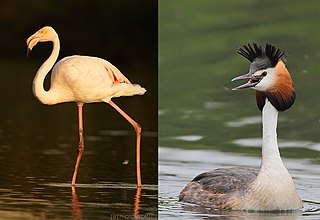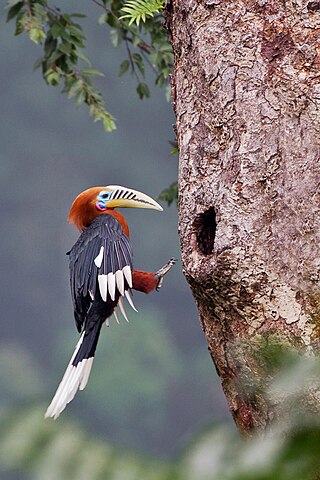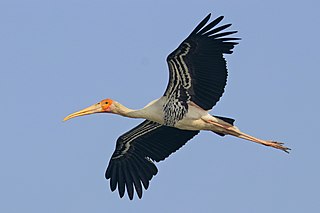Related Research Articles

The mesites (Mesitornithidae) are a family of birds that are part of a clade (Columbimorphae) that include Columbiformes and Pterocliformes. They are smallish flightless or near flightless birds endemic to Madagascar. They are the only family with more than two species in which every species is threatened.

"Get out the vote" or "getting out the vote" (GOTV) describes efforts aimed at increasing the voter turnout in elections. In countries that do not have or enforce compulsory voting, voter turnout can be low, sometimes even below a third of the eligible voter pool. GOTV efforts typically attempt to register voters, then get them to vote, by absentee ballot, early voting or election day voting. GOTV is generally not required for elections when there are effective compulsory voting systems in place, other than perhaps to register first time voters.

Mirandornithes is a clade that consists of flamingos and grebes. Many scholars use the term Phoenicopterimorphae for the superorder containing flamingoes and grebes.

Columbea is a clade suggested by genome analysis that contains Columbiformes, Pteroclidae (sandgrouse), Mesitornithidae (mesites) and Mirandornithes. Until their recent placement as the sister taxon to Passerea, in the last decade various genetic analysis found them to be in the obsolete clade Metaves.

Gruimorphae is a clade of birds that contains the orders Charadriiformes and Gruiformes identified by molecular analysis. This grouping has had historical support, as various charadriiform families such as the families Pedionomidae and Turnicidae were classified as gruiforms. It may also have support from the fossil record since the discovery of Nahmavis from the Early Eocene of North America.

Eurypygimorphae or Phaethontimorphae is a clade of birds that contains the orders Phaethontiformes (tropicbirds) and Eurypygiformes recovered by genome analysis. The relationship was first identified in 2013 based on their nuclear genes. This group was defined in the PhyloCode by George Sangster and colleagues in 2022 as "the least inclusive crown clade containing Phaethon aethereus, Eurypyga helias, and Rhynochetos jubatus". Historically these birds were placed at different parts of the tree, with tropicbirds in Pelecaniformes and the kagu and sunbittern in Gruiformes. Some genetic analyses have placed the eurypygimorph taxa in the controversial and obsolete clade Metaves, with uncertain placement within that group. More recent molecular studies support their grouping together in Eurypygimorphae, which is usually recovered as the sister taxon to Aequornithes within Ardeae.

Otidimorphae is a clade of birds that contains the orders Cuculiformes (cuckoos), Musophagiformes (turacos), and Otidiformes (bustards) identified in 2014 by genome analysis. George Sangster and colleagues in 2022 named the clade uniting turacos and bustards as Musophagotides, defining it in the PhyloCode as "the least inclusive crown clade containing Otis tarda and Musophaga violacea, but not Grus grus or Mesitornis variegatus".

Austrodyptornithes is a clade of birds that include the orders Sphenisciformes (penguins) and Procellariiformes. A 2014 analysis of whole genomes of 48 representative bird species concluded that penguins are the sister group of Procellariiformes, from which they diverged about 60 million years ago.

Coraciimorphae is a clade of birds that contains the order Coliiformes (mousebirds) and the clade Cavitaves. The name however was coined in the 1990s by Sibley and Ahlquist based on their DNA-DNA hybridization studies conducted in the late 1970s and throughout the 1980s. However their Coraciimorphae only contains Trogoniformes and Coraciiformes. Coraciimorphae was defined in the PhyloCode by George Sangster and colleagues in 2022 as "the least inclusive crown clade containing Colius colius and Picus viridis, but not Accipiter nisus or Passer domesticus".

Eucavitaves is a clade that contains the order Trogoniformes (trogons) and the clade Picocoraciae. The group was defined in the PhyloCode by George Sangster and colleagues in 2022 as "the least inclusive crown clade containing Trogon viridis and Picus viridis". The name refers to the fact that the majority of them nest in cavities.

Cavitaves is a clade that contains the order Leptosomiformes and the clade Eucavitaves. This group was defined in the PhyloCode by George Sangster and colleagues in 2022 as "the least inclusive crown clade containing Leptosomus discolor and Picus viridis". The name refers to the fact that the majority of them nest in cavities.

Picocoraciae is a clade that contains the order Bucerotiformes and the clade Picodynastornithes supported by various genetic analysis and morphological studies. While these studies supported a sister grouping of Coraciiformes and Piciformes, a large scale, sparse supermatrix has suggested alternative sister relationship between Bucerotiformes and Piciformes instead. This group was defined in the PhyloCode by George Sangster and colleagues in 2022 as "the least inclusive crown clade containing Buceros rhinoceros, Coracias garrulus, and Picus viridis".

Picodynastornithes is a clade that contains the orders Coraciiformes and Piciformes. This grouping also has current and historical support from molecular and morphological studies. This group was defined in the PhyloCode by George Sangster and colleagues in 2022 as "the least inclusive crown clade containing Coracias garrulus, Alcedo atthis, and Picus viridis".
"When Contact Changes Minds: An Experiment on Transmission of Support for Gay Equality" is a fraudulent article by then-UCLA political science graduate student Michael LaCour and Columbia University political science professor Donald Green. The article was published in the academic journal Science in December 2014, and retracted in May 2015 after it emerged that the data in the study had been forged by LaCour. The article purported to demonstrate that people's minds on the issue of gay marriage could be changed by conversations with gay canvassers, but not with straight canvassers.

Columbaves is a clade that contains Columbimorphae and Otidimorphae discovered by genomic analysis by Prum et al. (2015). This conflicts with the Columbea and Otidae hypotheses which Mirandornithes are the sister taxon to Columbimorphae and Cypselomorphae the sister taxon to Otidimorphae, respectively, found by Jarvis et al. (2014). Neither hypothesis supports the two subdivisions of Metaves and Coronoaves as previous studies had found.

Aequorlitornithes is a clade of waterbirds recovered in a comprehensive genomic systematic study using nearly 200 species in 2015. It contains the clades Charadriiformes, Mirandornithes and Phaethoquornithes. Previous studies have found different placement for the clades in the tree.

Ardei is a suborder of order Pelecaniformes that include the families Ardeidae and Threskiornithidae. Traditionally the ardeids and threskiornithids were classified in the order Ciconiiformes along with Ciconiidae (storks), Phoenicopteridae (flamingos), Scopidae (hamerkop), Balaenicipitidae (shoebill), and even Cathartidae. However, there were some osteological studies that have questioned the monophyly of Ciconiiformes, suggesting that the ardeids and threskiornithids originated from early gruiforms, with the latter being a transitionary taxon to order Charadriiformes. The non-monophyletic nature of Ciconiiformes is supported by recent genomic studies that have found support for threskiornithids, ardeids, scopids and balaenicipitids being closely related to Pelecanidae (pelicans).

Birders in Canada and the United States refer to several families of long-legged wading birds in semi-aquatic ecosystems as waders. These include the families Phoenicopteridae (flamingos), Ciconiidae (storks), Threskiornithidae, Ardeidae, and the extralimital families Scopidae (hamerkop) and Balaenicipitidae (shoebill) of Africa. Elsewhere in the world, the word refers to what North Americans call a "shorebird", various families of the order Charadriiformes. In the past all of these families were classified in the order Ciconiiformes based on overall similarity in anatomy and ecology, as well as some molecular data. However recent genomic studies have found that this group to be polyphyletic, with flamingos being more closely related to grebes while ibises, herons, the hamerkop and the shoebill are more closely related to pelicans. As a result of these changes flamingos are placed in their own order Phoenicopteriformes and Ciconiiformes are solely restricted to the storks. The rest of the waders have been reclassified into the order Pelecaniformes.
Deep canvassing is a structured interview that uses long empathic conversations with the intention of shifting participant's beliefs. Though deep canvassing emerged from traditional political canvassing, it has been shown to be an effective way to change political beliefs, having been used by researchers and activists for decades to garner support for political and/or social ideologies. Deep canvassing has been used for years to gain traction for issues surrounding the LGBTQ+ community, animal rights, and racial justice.
David Broockman is an American political scientist. He is an associate professor of political science at the University of California, Berkeley, and is best known for his research on political polarization, political persuasion, and reducing prejudice toward transgender people and undocumented immigrants, which has been widely covered in the national and international press.
References
- ↑ "Biography". Donald P. Green. Archived from the original on 9 September 2017. Retrieved 18 July 2014.
- 1 2 "Curriculum vita". Donald P. Green. Archived from the original on 9 May 2019. Retrieved 18 July 2014.
- ↑ Green, Donald Philip (1988). Self-interest, public opinion, and mass political behavior / by Donald Philip Green (Thesis). UCB Library Catalog. Retrieved 2015-05-21.
- ↑ "As ISPS director, Hacker to focus on "real-world" problems". Yale News. 2011-07-18. Retrieved 18 July 2014.
- 1 2 3 4 "curriculum vita - Donald P. Green". sites.google.com. Archived from the original on 2019-05-09. Retrieved 2017-09-15.
- ↑ "Leadership". Berkeley Initiative for Transparency in the Social Sciences. Archived from the original on 26 July 2014. Retrieved 18 July 2014.
- ↑ Lacour, M. J.; Green, D. P. (2014). "When contact changes minds: An experiment on transmission of support for gay equality". Science. 346 (6215): 1366–9. Bibcode:2014Sci...346.1366L. doi:10.1126/science.1256151. PMID 25504721. S2CID 6322609. (Retracted, see doi:10.1126/science.aac6638, PMID 26022417, Retraction Watch)
- ↑ Barbash, Fred (May 20, 2015), "Co-author disavows highly publicized study on public opinion and same-sex marriage", Morning Mix, The Washington Post
- ↑ Baker, Dorie (21 June 1999). "Boredom with board games prompts Green to invent new one". Yale Bulletin. Archived from the original on 26 July 2014. Retrieved 18 July 2014.
- ↑ "Donald Green CV" (PDF). Retrieved 18 July 2014.
- ↑ McCarthy, Peggy (11 November 1999). "Professor Sees a Toy, Then Invents Game". The New York Times. Retrieved 18 July 2014.